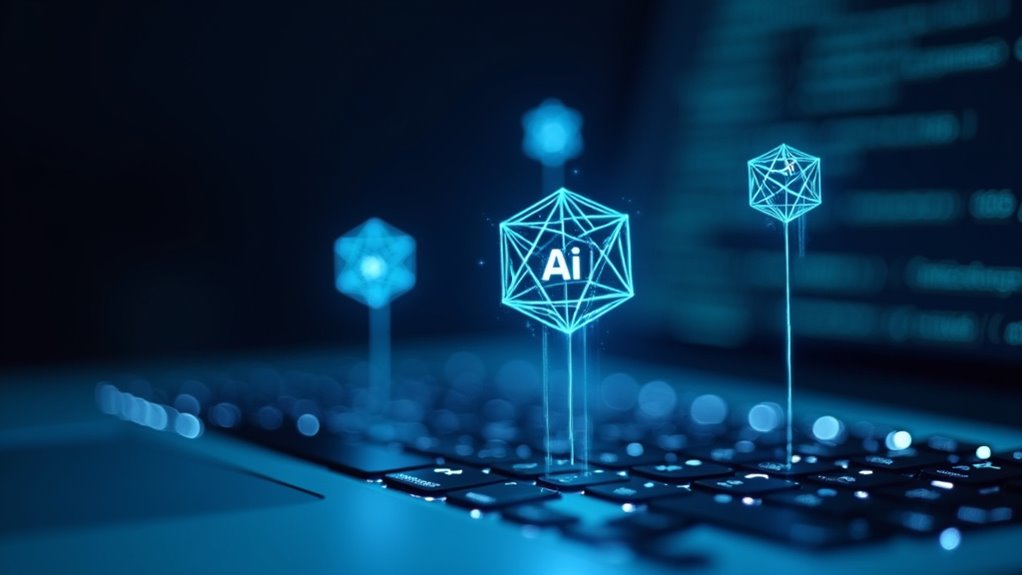Top business AI applications span multiple departments with impressive results. Finance teams leverage AI for lightning-fast cash flow projections and error-free accounting. Customer service deploys chatbots that handle routine inquiries while humans tackle complex issues. Marketing departments personalize customer interactions, with Amazon’s recommendation engine driving 35% of revenue. Supply chain AI optimizes inventory and delivery routes, while healthcare applications enhance diagnostics and treatment plans. These real-world applications aren’t just futuristic concepts—they’re delivering measurable ROI today.

As businesses race to stay competitive in today’s digital landscape, artificial intelligence has emerged as the game-changing technology that separates industry leaders from the pack. Companies across sectors are leveraging AI’s transformative power to streamline operations, boost productivity, and drive innovation—all while maneuvering through complex AI Ethics considerations.
Many organizations now realize that responsible AI implementation isn’t just good PR—it’s good business. Future Trends suggest we’re only scratching the surface of AI’s potential, with more sophisticated applications emerging daily. Experts predict that agentic AI will see increased adoption by 2025, autonomously performing complex tasks that once required human intervention.
Embrace responsible AI today—tomorrow’s innovations are already being coded.
In finance departments, AI now handles mundane accounting tasks with superhuman accuracy. Cash flow projections that once took days happen in seconds. Transaction categorization? Automated. Financial forecasting? More precise than ever.
These systems don’t just crunch numbers—they find money-saving opportunities hiding in plain sight.
Customer service has undergone its own AI revolution. Those chatbots you’re chatting with? They’re getting smarter by the day. They handle routine inquiries while human agents tackle complex issues. Some systems even analyze caller sentiment in real-time. (Yes, the machine knows when you’re frustrated.)
Marketing teams aren’t being left behind. AI integrates seamlessly with CRM systems to optimize campaigns and personalize customer interactions. Gone are the days of one-size-fits-all marketing. Today’s AI knows what customers want before they do. Amazon demonstrates this power with their recommendation engine that drives 35% of revenue through personalized product suggestions.
Supply chain managers use AI to predict demand fluctuations, optimize inventory levels, and suggest the most efficient delivery routes. Weather delays? Traffic jams? AI factors it all in. The result? Lower costs and happier customers.
Healthcare providers leverage AI to enhance diagnostic accuracy, develop personalized treatment plans, and improve patient engagement. Early disease detection saves lives. Period. Medical imaging has been particularly transformed through AI-assisted diagnosis, enabling clinicians to identify conditions with greater speed and accuracy than ever before.
HR departments deploy AI to streamline recruitment, assess employee skills, and enhance workforce planning. Finding top talent isn’t about luck anymore—it’s about algorithms.
The question isn’t whether your business should adopt AI, but how quickly you can implement it before competitors do. The AI revolution is here. Don’t get left behind.
Frequently Asked Questions
How Much Does Implementing AI in Business Typically Cost?
Implementing AI in business varies dramatically in cost. Small companies typically budget $5,000-$30,000 for initial AI implementation, while complex projects can exceed $100,000.
Large corporations? They’re looking at $200,000 to millions. Your implementation budget must also account for ongoing expenses—expect monthly maintenance costs between $1,000-$5,000, plus annual operational costs reaching 35-95% of your initial investment.
Don’t forget data preparation and integration challenges, which frequently inflate the final AI cost beyond initial estimates.
What Skills Do Employees Need to Work With Business AI?
Employees working with business AI need a foundational mix of technical and soft skills.
Data literacy tops the list—you can’t work with AI if you can’t understand what it’s telling you.
Problem solving abilities separate the effective AI users from the frustrated ones. Additionally, critical thinking helps evaluate AI outputs, while basic technical understanding prevents that deer-in-headlights look when someone mentions “algorithms.”
How Long Does AI Implementation Take for Small Businesses?
AI implementation timelines for small businesses vary dramatically.
The AI timeline estimation depends on solution complexity—simple chatbots might take days, while extensive systems require months.
Implementation phases typically include assessment, data preparation, integration, and training.
Most small businesses complete basic AI adoption in 2-6 weeks with the right resources.
Remember, quality matters more than speed! Rushing implementation without proper planning creates more problems than it solves.
Start with one focused application before expanding.
Can AI Replace Senior Management Decision-Making Roles?
AI can enhance but not replace senior management.
While AI capabilities excel at data processing and pattern recognition, it lacks the emotional intelligence and ethical judgment essential for leadership.
Decision making ethics demand human oversight—AI simply can’t navigate complex stakeholder relationships or inspire teams.
Think of AI as your brilliant but socially awkward assistant: great with numbers, terrible at negotiating.
The future isn’t AI replacement, but strategic partnership with executives who maintain the human touch.
What Security Risks Come With Adopting Business AI Solutions?
Business AI adoption brings significant security risks.
Data privacy concerns loom large when AI systems handle sensitive information; inadequate security can lead to breaches that expose customer data or trade secrets.
Ethical concerns emerge when AI makes decisions without proper oversight—yes, even your fancy new chatbot could leak confidential information!
Companies must implement robust encryption, regular security assessments, and thorough training protocols.
Don’t just rush to implement AI; secure it properly or face potentially devastating consequences.









